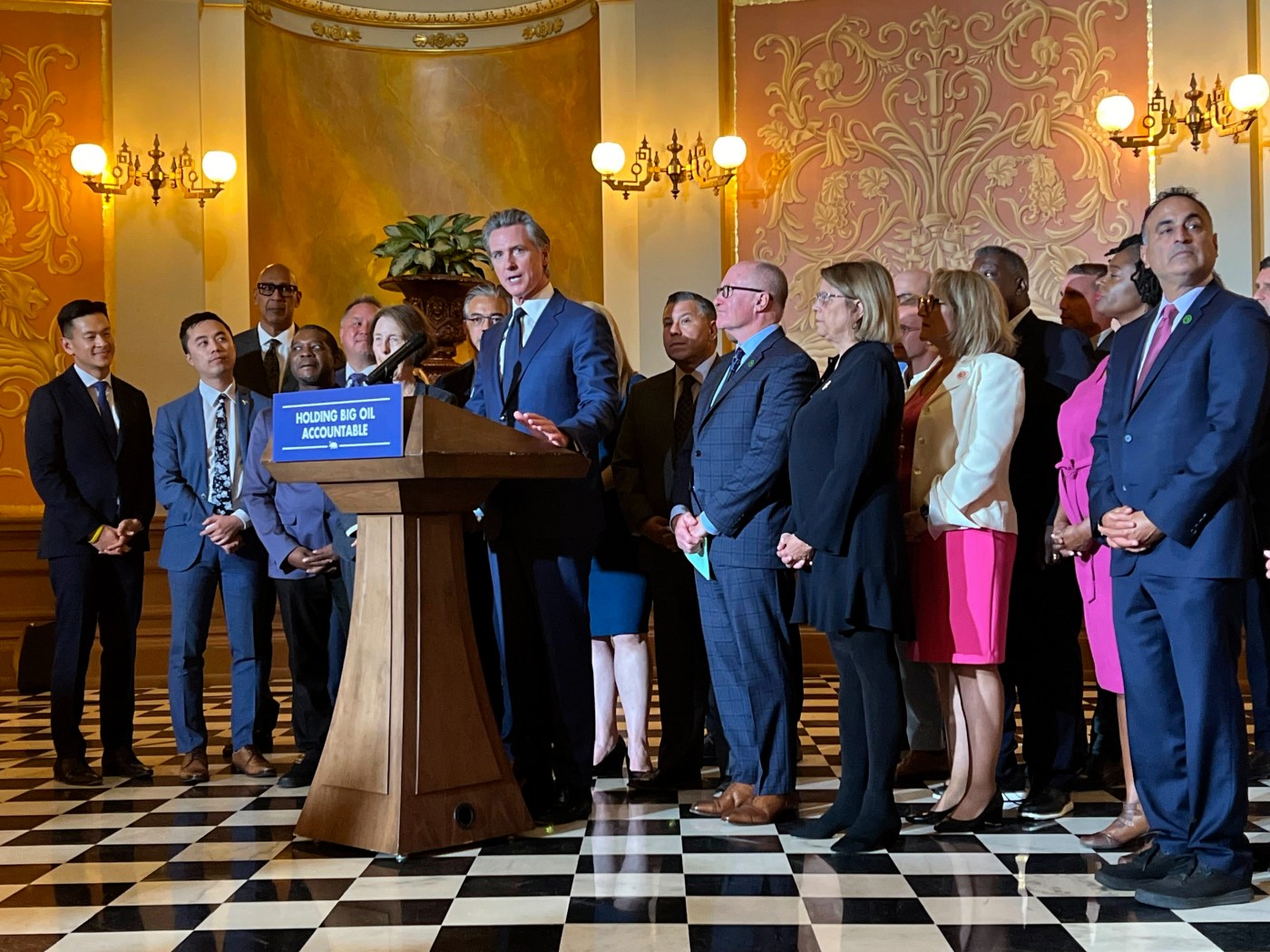
Walters: What’s behind the political theater over California’s high gas prices?
California’s governors and legislators often do things that defy real world rationality and can only be explained, if not justified, in political terms. This month’s exercise in political theater over gasoline prices is an extreme example.
California’s gas prices are, as every motorist knows, much higher than those of other states. Just driving into Nevada and Arizona for a fill-up will likely cost a dollar per gallon less than it would in California — even though the fuel probably came from a California refinery.
The vast majority of that differential is explained by California’s unique gasoline blend, mandated to fight smog, and its highest-in-the-nation direct and indirect taxes.
In a 2023 paper, Severin Borenstein, a UC Berkeley economist regarded as the state’s leading expert on the issue, pointed out that California’s direct and indirect taxes on fuel amount to nearly $1 per gallon — 70 cents higher than the national average of such taxes — and the unique fuel blend adds another dime. Borenstein has also called for a deeper review of what he’s dubbed a “mystery gasoline surcharge,” which two years ago averaged 65 cents.
Despite those high prices, gasoline is still a relatively small segment of what it costs to live in California. Driving 240 miles a week in a car that gets 20 miles to the gallon might cost $12 more than it does in another state.
Nevertheless, gas prices command an inordinately high level of public attention as a symbol of anxiety about living costs in general, and therefore are ripe for political exploitation.
Gov. Gavin Newsom has been gaslighting Californians about gas prices for the last couple of years, bypassing the simple fact that taxes and other mandated costs are key factors in high prices and insisting that refiners are gouging motorists.
He never offered proof — nor have legislators insisted that he provide it — before enacting new laws that he says will prevent price spikes. The latest, finalized on Monday, requires refiners to hold more fuel in reserve to ease the impacts of maintenance shutdowns.
At best, having more gas in reserve might shave a few pennies from a gallon of gas, but it could also increase prices, as the California Energy Commission conceded. In a recent analysis, several commissioners wrote that Newsom’s proposal could “artificially create shortages in downstream markets” and “increase average prices.”
So is there more to Newsom’s demand that the Legislature convene a special session on gas prices than just election-year grandstanding?
There is a noteworthy back story: The state has vowed to completely wean itself off carbon-based energy, eventually shutting down its remaining nine refineries but still maintaining a supply of gasoline during the transition.
Last year, the California Air Resources Board published a report on the interim step of adopting a so-called Low Carbon Fuel Standard to provide “the economic incentives to produce cleaner fuels like electricity, hydrogen and biofuels that are needed to displace fossil fuels and reduce transportation sector emissions.”
Related Articles
California Democrats want to slash gas prices, a state climate policy will raise them
Gov. Newsom signs bill he says will help avoid gas price spikes
California Assembly passes measure aimed at easing gas price spikes
Skinner: Gasoline reserves can save us all money at the pump
Gov. Newsom signs new laws cracking down on oil industry in California
The report said that adoption could immediately increase gas prices by 47 cents a gallon and then, “on average, from 2031 through 2046 the proposed amendments are projected to potentially increase the price of gasoline by $1.15 per gallon, potentially increase the price of diesel by $1.50 per gallon and fossil jet fuel by $1.21 per gallon.”
The report generated a flurry of adverse media and political attention and CARB backed off somewhat. It now refuses to put a number on the program’s effect on gas prices. Nevertheless, it’s apparent that the transition from gasoline-powered automotive travel will hit consumers hard.
Perhaps the performative legislation adopted Monday is aimed at diverting attention from the larger effects of transition or portends ever-increasing state micromanagement of refineries to avoid sudden closures that would lead to shortages and serious price spikes.
Dan Walters is a CalMatters columnist.


